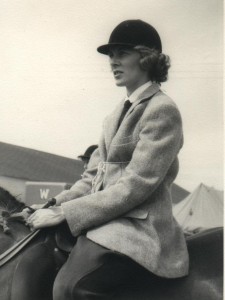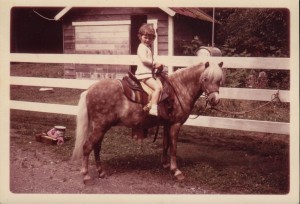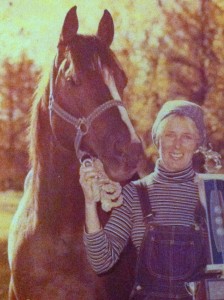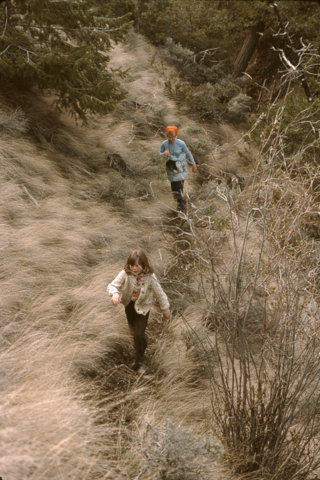You may have been wondering where I’ve got to these past weeks. The posts have been few, and the humour laboured, if there at all. I’m afraid I’ve had all too good an excuse: my mother Elizabeth (known to most in the horse community as Liz) passed away on November 3rd.
I have always done my best to find topics to write about on this blog that are important, interesting or at least entertaining. Today I’m going to ask you to indulge me as I attempt to make the loss of my mom a little more bearable by sharing with you a couple of stories which illustrate what an extraordinary person she was. I promise to keep it to two stories, I promise not to go all sentimental on you, and I promise to keep it horse-related.
Back in the nineteen sixties, when I was just a tiny tot with a tiny tot-sized evil pony named Monty, we lived in the small town of Hope, about 160 km east of Vancouver.
Rumour has it my mom, Liz, was the first person in the immediate area with an English saddle. One summer, when I was too small to have any memory of it, Liz and some of her closest saddle pals concocted an adventure of epic (some would say insane) proportions. They would do a week-long ride from Hope to Merritt via the single vehicle dirt track that used to be the only way to ascend the Coquihalla Valley – a wild and remote place known to few besides Kinder Morgan, which laid a pipeline through there in 1953. The drop from the Coquihalla Summit to Hope at the bottom is so steep that the oil in the pipeline doesn’t have to be pumped on its ongoing horizontal journey to the BC coast – gravity takes care of it.
Liz’s steed of the moment was a big, nasty package called Champ, a Belgian cross that she had inherited after a close friend from Nova Scotia was killed in a car accident. Champ was perfectly lovely once you were aboard, but he was a rotten bastard on the ground. At a stopping point shortly after their departure into the wilderness, Liz tied Champ with a towing chain to the pick up that had accompanied the riders with camping equipment and feed. As a general policy, Champ didn’t take kindly to being tied up, and Liz knew that if she tied him to one of the nearby trees small enough to get a rope around, it would shortly be uprooted and dragged at speed back toward Hope. Now, Champ really was huge; Liz had underestimated his power and perhaps overestimated the stationary qualities of a wheeled vehicle. Shortly after being attached, Champ began to ‘tow’ the truck. Liz rushed in to disconnect Champ from the bumper, and instead came very close to disconnecting her pinky finger from her hand when it got pinched in the chain that had 1800 pounds of chestnut fury yanking on it.
After some predictable yelling and chaos followed by some bleeding and near-fainting, Liz’s hand was bandaged up by one of her co-adventurers, who had the good grace to be a nurse. And off they set once more. I’m not sure if it was later the same day or the next, but it wasn’t long before Champ realized he had even more of a ground advantage, thanks to Liz’s unusable bandaged hand. Soon Liz was not only missing the use of a hand; she had a broken ankle as well, after Champ knocked her down and stepped on her with a large, malevolent hoof.
Most of us would not have embarked on such a trip as the Coquihalla ride in the first place. Nearly losing a finger would send most of the rest into hasty retreat to the safety of home. And a broken ankle? Well, you can’t even get on a horse with a broken ankle, can you?
Liz was driven in the support truck back to the hospital in Hope, where her ankle was put in a cast, and presumably some strong pain killers – maybe 292s – were dispensed. And then she rode in the truck right back into the wilderness where the group was waiting. Cell phones weren’t even an idea in the mind of their inventor back then, and I can hardly imagine the great surprise on the riders’ faces when they saw Liz in the truck. She completed that ride with one hand in a bandage and one leg in a cast. Of course she had a lot of help from her friends, who I’m sure enjoyed handling Champ not one bit. When they arrived in Merritt, the group checked into a motel with a pool, and proceeded to soak off a week’s worth of trail dirt. Liz had overcome much bigger obstacles that week, and was not to be cheated of her reward. She enjoyed a refreshing dip in the pool (and no doubt a refreshing beverage as well) with her cast covered in a garbage bag, propped up on the rim.

Liz at a horse show in the sixties, possibly in Rosedale, BC and just possibly aboard Champ – sporting the determined look that accompanied her on so many exceptional journeys
Fast forward a decade to Prince George, BC, where Liz had built and was running a thriving equestrian centre. In her youth back in Nova Scotia, Liz would walk into a field of unknown horses armed with nothing but a halter. She would catch whichever specimen was most approachable, and vault on. Not all her rides were fun-filled romps through the daisies, since she occasionally hopped onto something not-quite-broke. But those early forays into being a person who would ride anything served Liz well later on when she became a horse trainer in northern BC.
One of the horses Liz trained and showed was a good-looking Arab stallion named Abisha Nahanni. Nahanni’s character fell somewhere on the bad-ass scale between Champ and the devil himself, but Liz discovered that his toughness made Nahanni well-suited to endurance riding. I recall one memorable trip to the Vanderhoof Fall Fair, a much-loved horse show in my childhood that I always looked forward to. Most of us chose a sensible way to get to the horse show, a 50 mile drive from Prince George, in trucks and trailers. But not Liz. She wanted to make a dry run leading up to Nahanni’s first 50 mile endurance ride, so she rode him the first 25 miles of the distance to the show. I’m pretty sure she showed him all weekend too, but I also seem to recall that Nahanni was given a reprieve and trailered the entire distance home at the end of the weekend.
In the second year of Nahanni’s short but successful endurance career, Liz was out putting some miles on him on one of the many skidder trails and logging roads that led from the back of our property for hundreds of miles into the wilderness. As she galloped down a hill about five miles from home, Nahanni stumbled and somersaulted, propelling his rider into the road and landing on his back. Liz got up and grabbed the reins before Nahanni, who had not immediately got to his feet, decided to make a solo return to the barn. No one would have had the first idea of where to start looking for Liz if she didn’t get home on her own, and the obvious choice of a vehicle was the slightly stunned horse standing in front of her. I do not know how my mother got back on that horse, much less how she endured the bump and grind of the ride back to our front lawn, where she beckoned our live-in barn manager and myself to help her off and take her to her next destination: the hospital. She had broken her collar-bone.
One word that has always befitted my mother is ‘fearless’. It’s not that she had no fear. She was not fond of heights, and that aversion extended to riding horses over jumps. But she did her share of jumping when coaching exams required it. She was not without fear, but she never let fear prevent her from achieving a goal. Perhaps ‘fearless’ isn’t the right word. ‘Fear-conquering’ is more accurate, and if it’s not a word, I officially coin it here in honour of my mom.
I hope you can forgive me for lacking the ability to care about such questions as who has managed to gain control over the million dollar horse shipping budget that will mean free rides for all the non-Canadian horses competing at Toronto 2015 next summer. Or whether FEI Sec Gen Ingmar de Vos will succeed in becoming his own boss if he wins the FEI Presidential election next month on a campaign platform that includes melding the volunteer position of President with the paid job he currently holds down. It’s not that such things aren’t important. They are, and I’m sure I’ll get myself into a lather over them again one day soon. In the meantime, please bear with me. My mother Elizabeth was a remarkable woman who raised me to believe I could achieve anything, and right now I just miss her like anything.



